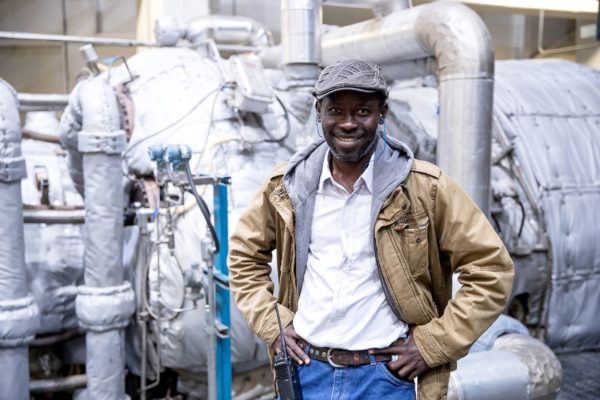What starts here — inside 150 university buildings — changes the world: Heart valves are created on 3D printers, airplane wings are tested in wind tunnels, and music is recorded in studios. Thousands of students live, eat and sleep on campus.
None of this would be possible without electricity from the Carl J. Eckhardt Combined Heating and Power Complex.
Underneath the shuffling of foot traffic at the corner of Speedway and 24th Street, there is a soft hum. At the power plant, two gas turbines, four steam turbines and four boilers — some as old as 70 years — generate energy for campus.
The plant has won numerous awards and has been recognized by the International Energy Agency, International District Energy Association and Texas Commission on Environmental Quality. The University of Texas at Austin has more than doubled in size, but because of efficiency improvements the plant’s carbon emission levels have returned to 1976 levels, Associate Vice President for Utilities and Energy Management Juan Ontiveros says. Additionally, he says, “fuel consumption has remained flat since 1997.”
The plant’s annual budget — including labor, materials, equipment, debt service and natural gas — is about $63 million, Ontiveros says. And for the past two decades, the university has made “unprecedented reinvestment” into the plant, using funds from energy savings to reduce fuel costs and provide budget stability.
Though the machinery is important, Roberto Del Real, Energy Management and Optimization associate director, says the department puts its 170 employees first.
Our staff members are “our most valuable investment,” Del Real says.
Down the hall from his office sits Eduardo Juvera. He has worked at the power plant for seven years — though he’s been a part of the industry for 26 years. Juvera, who is originally from Mexico, spent much of this time at steel mills.
“A steel mill is normally in the middle of nowhere — hidden from civilization,” Juvera says. “It’s not the cleanest process. It’s harsh.”
But the control systems manager says he uses what he learned at those mills and applies it to his work today.
“There’s always a challenge,” Juvera says. “The processes that we have here are very different than what I was used to, so I’m learning all the time.”
When Juvera isn’t writing code for programmable logic controllers, the computers that run the machinery, he is meeting with the operations staff. He oversees the repair of any equipment problems, scheduled maintenance checks and the progress of new projects or developments.
Juvera often works with utilities operations supervisor Kwabena Odame-Darkwa. Every day, Odame arrives for his shift an hour early — at 5 a.m. First, he meets with the nighttime staff members to see which machines need attention. From there, he spends his day all around the plant, checking on equipment to make sure it is meeting campus demands.
“It’s kind of a lot,” Odame says. “But once you get used to it, it becomes a routine.”
The operations supervisor, originally from Ghana, says he realized he would go into engineering early on.“When I was a kid, I liked electronics — messing with things,” he says.
After moving to San Marcos, where his wife took classes, he began working at the chilling station on UT’s campus. A year later, in 2011, he was transferred to the power plant. He, like Juvera, says he has enjoyed working in the environment at UT.
“I worked in different places where they put more pressure on you,” Odame says. “You cannot think. But here, they give you leeway.”
Last year, he was promoted to operations supervisor. He says that at first, he didn’t think the job would be much more difficult.
“But I realized that I have the whole plant — all of UT — on my shoulders,” Odame says. “Whatever happens here affects all of campus and costs a lot of money. Now, before I do anything, I have to think it through: What is going to happen if I do this?”




